- Home
- Jane Arbor
The Cypress Garden Page 2
The Cypress Garden Read online
Page 2
‘That—’ he hesitated, seeming to be choosing his words. ‘That if at the end of the evening you still don’t feel the slightest bit involved or ... or committed, I’ll leave you alone.’
‘I shan’t be involved,’ she warned.
‘Then that will be that, won’t it? Agreed,’ he said, and led her out to his car.
He claimed that it was too early yet to eat, so as the dusk deepened they drove slowly through the Borghese Gardens and stopped for an aperitif at a bar near the Zoo.
While they were there he asked, ‘That’s one impertinent question I didn’t put yesterday. Have you a current boyfriend?’
‘No,’ Alix told him—and thought too late that it would have been wiser to put him off with Yes. In her turn she asked, ‘By the way, did you win your bet with your friend?’
‘With my—?’ Michele’s echo was oddly blank. ‘Oh, Beppo—yes. No, that is, I haven’t seen him yet. But I shall.’ Back in the car again he asked if she had any preference of restaurant, and later she was to wonder why he had offered her a choice. But at the time she said she would leave it to him, and he decided on the Casino Dei Fiori, one of the city’s luxury garden restaurants, where Alix had been only once before.
It was at the door that the first of the nightmare evening’s embarrassments occurred. The signore had not booked a table? Then there was no room. All the tables were engaged or already occupied, Michele was told.
He protested. This was nonsense. They could find room for an extra table for two. He would wait—though not for long. And when this concession proved no Open Sesame he demanded to see the head waiter.
The man came and Michele drew him aside. Alix heard the name Parigi being bandied; the head waiter bowed and then they were shown out to a flower-bedecked terrace filled with candle-lighted tables under a canopy ceiling of cool bamboo plait.
Following in file behind Alix, Michele suddenly touched her elbow. ‘Of all the chances!’ he exclaimed. ‘My people—dining over there!’ He signalled to the waiter, already drawing out a chair for Alix. ‘You can keep that table now. We shall be joining Signor Parigi’s party here.’ And he drew Alix in the opposite direction.
It was in that moment, between seeing the waiter’s shrug of acceptance and of finding herself at the other table, that a sixth sense told Alix she had been tricked. For some reason best known to Michele Parigi, he had intended that they dine here tonight, at this time, and that his surprise at seeing his family here too had been feigned. He had meant she should meet them. Why?
She was aware of the scrutiny of two ladies, the younger a girl probably a little older than herself. She was a beauty, with a wealth of dark hair elaborately whorled and piled for evening, eyes which were blue-black in the candle shadows and a profile without fault. Her survey of Alix held less interest than a slightly arrogant appraisal—rather as if she would not have found a curtsy from Alix out of place. The older woman, by contrast, had an air of unsureness of herself, of defeat.
Alix was rightly to judge that Signora Parigi was no more than in her late forties, but she had none of the poise of fulfilled, wealthy middle age. She had not made up skilfully and her mouth was downdrawn in a permanent curve. Her upswept mouse-coloured hair was secured by too many jutting combs and though her gown was elegant, she continually touched and adjusted its décolletage with nervous, bony fingers overloaded with rings. Her restless glance now darted from Michele to Alix and back again, resting on him with spiritless fondness.
The third member of the party—a man—stood up and by doing so seemed to dominate the small tableau. He was very tall; broad-browed; his heavy-lidded eyes as dark as the girl’s. He was possibly no more than ten or twelve years Michele’s senior, but he was assured and mature, where the latter was gangling and restive. His look was straight and uncompromising; only the slight upward quirk of an eyebrow seemed to ask a question of Michele.
Michele answered it by introducing Alix to his mother. ‘Mama, this is Alessandra—though, as I told you, she likes to be called Alix. Alix, our cousin, Venetia. And this is Leone, my half-brother.’
Leone Parigi acknowledged Alix with a bow. ‘A pleasure, Signorina Rhode.’ Venetia d’Anza’s greeting was a lift of her delicate chin, and Signora Parigi extended a narrow hand to lie limply in Alix’s grasp.
She said wanly, ‘We have heard all about you from Michele, my dear. Though not as much as we shall hope to know, now we have met you. He has been a little naughty, you know—keeping us from you for too long. And even this evening—’ she turned to Michele to accuse him, ‘You knew Leone was bringing Venetia and me to dine here tonight. Why didn’t you say you meant to bring—Alessandra? We could have made a party and come all together. But you’ll stay now?’
‘If we’re welcome.’ Michele put Alix into the chair brought by a waiter and sat himself. He corrected his mother, ‘Alix, please. She prefers it,’ then leaned conspiratorially towards the older woman. ‘I wanted to spring her as a grand surprise, you see. Besides, I still have to watch my step. Supposing she had decided she wanted to dine somewhere else, I wouldn’t dare to thwart her, and then where would the party have been?’
He looked with interest at the table. ‘Now, let’s see—you’ve had the ministre? Well—’ he appealed to Alix, ‘what do you say, carina? Shall we skip a course and join them in the next?’
Dazed and nonplussed, Alix inclined her head. Under cover of the ensuing discussion over the menu, she tried to understand what had been said and implied between Michele and his mother ... We have heard all that Michele has told us about you ... Not as much as we shall hope to know. What was going on? What elaborate trickery was Michele Parigi up to? And why? She supposed that at the first word he had uttered she should have contradicted him, explained herself. But explained what, when she was still in the dark as to what their relationship was supposed to be? And before she could gather herself, the waiter had gone off with the order and she became only too aware of her hosts’ interest, shown by their probing questions.
Evidently they had seen the signed snapshot of her and they seemed to know all that she had briefly told Michele about her circumstances. But clearly he had embroidered some of the truth or suppressed it, and whenever the questions threatened a quandary, he hastened to forestall her replies.
Michele’s mother’s question, ‘And your father was an English banker, Michele says?’ assumed wrongly that Mr. Rhode had operated somewhere on the financial level of a Zurich Gnome. But before Alix fully managed the correction, ‘Well, not exactly, though he was in banking. In—’ Michele had cut in, ‘I told you, Mama, Signor Rhode was connected with the English bank, the City and Metropolitan, with branches over here,’ and adroitly changed the subject to ask Alix if she were enjoying her cipollirte, the stewed button-sized onions which accompanied her choice of young lamb in a sour-sweet sauce.
The next question she was able to answer with truth. Yes, she had been educated in England. But arising from Signora Parigi’s murmured compliment on the excellence of her Italian came a comment from Venetia—‘Well, I daresay, Zia Dora, she perfected it when she was sent to Italy to finish. At my own finishing-school, remember, there were quite a lot of English girls who spent a year here to do just that. And, we always thought, with the idea of landing either a rich husband or an Italian title. Though that, I suppose, was only by the way.’
Alix contrived to turn her gasp into a short laugh. This was too much! ‘But I came because my father was ill, not to a finishing-school,’ she said.
The other girl knit her brows. ‘Then you were finished in England before you came?’
‘No. I just left school at eighteen. Nowadays in England only very rich girls or the debutante set can afford finishing schools abroad.’
‘Really?’ The word held a world of comment, but the subject dropped. And after that, arising from some mention of their home, Alix put the ball into their court by asking about it.
It was Leone Parigi who answered. ‘We’re a
bout half an hour by car into the Alban Hills. Above the eastern shore of Lane Albano, with a private beach on the lake. But the villa is no ancient palazzo. My grandfather, who built it at the turn of the century, liked his domestic comforts, and we have modernized it since. It is low and white, with its face to the lake and its back to the gardens, where our chief pride is the hundred-metre cypress avenue that gives a vista to the fountain from which the house takes its name. But you’ll be seeing it for yourself, won’t you? You must come to see us very soon, now that Michele has brought you out from under the wraps he’s had round you since you met each other. That was at the English Club, I think? Where you are a member and where he happened to be invited by a friend?’
Outraged by this downright lie, more blatant than any of Michele’s half-truths yet, Alix caught her breath. But before she could reply, Michele’s foot pressed her sandal under the table and a clumsy movement of his elbow knocked her handbag from her lap to the floor. She glanced down; he was already there, making a business of pretending to grope for the bag’s contents.
His lips just moved. ‘Cover for me, please,’ they said. ‘Later, I’ll explain.’ Then he was up and in his seat and answering his stepbrother.
‘Yes, and a lucky break it was for me. There was Alix—and there was I. It was as simple as that. And anyway, now you’ve met her, can you honestly blame me for saving her up for a bit for myself?’
For answer Leone looked at Alix, his glance cool and analytic, and her own eyes dropped before it. He agreed with Michele, ‘No, one oughtn’t to blame you, perhaps,’ then he was ordering coffee and consulting with the wine-waiter over liqueurs, and she could be thankful that very soon now the fantastic ordeal must be over.
During that last quarter of an hour, while the general talk flowed round her, she had time to debate what she should have done.
Denounced Michele’s first evasion at the outset? Made her own position clear at his expense? Created a scene with these strangers in public before, bristling with virtue, she walked out on the lot of them?
But how could she have done that? They were kind. They had welcomed her as their guest, and they were as much Michele’s dupes as she was. They believed in him, and to have put herself in the role of innocent victim by contradicting him, half-lie by half-lie, would—at their table—indeed have been brutta figura—the ill-mannered, ‘not done’ thing which all Italians abhor.
And yet was that the whole truth of why she had kept silent? Against her will she admitted it was not. Looking at these people whom, after tonight, she was never likely to meet again, she knew she had briefly enjoyed their company and their acceptance of her. She had been drawn to the Signora’s gentle, rather negative charm; had been stimulated by some arrogance of looks or manner in the girl, Venetia, and sharply challenged by—what?—in the man Leone.
She did not know. Only that, apart from that measuring look in answer to Michele’s invitation to him to approve her, more than once during her ordeal she had caught his deep glance at her across the table. Each time, as if he had merely been waiting to get her attention, he had addressed some remark to her at once. But each time she had shrunk a little within herself and by that much further away from the shame of facing him, guilty of even as little complicity in the affair as Michele had forced on her.
For, though it could well be her own conscience at work, she had the impression that people did not deceive Leone Parigi with impunity, and if he saw fit to condemn he would do it harshly.
Signora Parigi would be hurt by Michele’s senseless masquerade, but Leone, Alix suspected, would sit in judgment on it and, by implication, on her. And so, fully as much as to save public face for them all, it had been in self-defence that she had played along with Michele as far as she had. She hadn’t wanted to be there to watch his family ... Leone Parigi in particular ... pitying her gullibility or despising her collusion. Reluctant as she was to face the truth of that, it was there.
At last Michele was making a move. ‘Well, I’ll be taking Alix on somewhere now, I think,’ he said and rising, dropped a kiss on his mother’s cheek. A waiter drew out Alix’s chair. Signora Parigi murmured, ‘Arrivederci. Michele must bring you to the Villa very soon,’ and Leone stood, offering his hand.
Alix gave him hers and he held it as he asked, ‘And what is your address now, signorina, since you left your father’s apartment?
She said, ‘I haven’t a real address at the moment. I’m hoping to move into a small apartment shortly. Meanwhile I’m staying at a pensione.’
‘Oh yes? Where?’
There was nothing for it. But she would see that she left no forwarding address when she moved out next week, and anyway Michele already knew where she was. She named the short street to Leone and watched again that questioning lift of his eyebrow. But stating rather than asking he echoed, ‘The Via Savella. That’s south-east across the river from Garibaldi. Not far, in fact, from Michele’s own city pied-a-terre—’ into which comment, so thorny was she by now, Alix read a criticism of her choice of neighbourhood which may or may not have been there.
She made no reply. Leone sat down again and she and Michele left. Outside, she put a single question to him, hoping it conveyed all the scorn she felt.
‘There never was a bet with any friend of yours named Beppo, was there?’ she asked.
He glanced obliquely at her from beneath his brows. ‘No,’ he admitted. ‘No bet.’
CHAPTER TWO
In the car Michele sat back, his hands on the steering-wheel. ‘I suppose this is where I have to start talking. We’ll drive somewhere, shall we? Out to Tivoli, perhaps?’ he said.
Alix said tersely, ‘We’ll drive nowhere but back to my pensione. You can do your talking there.’
He grimaced. ‘Under the fish-eye of that desk-clerk of yours?’
‘There’s a lounge. And when I’ve heard all I’m entitled to hear from you, you can go.’
‘If you say so.’ He sighed. ‘Though I admit I had hoped that at this stage you might be feeling just a little bit committed.’
‘Committed? To trickery? To the lies you’ve told your people? Letting them think we’d known each other for some time. That we’re quite—close. Telling them we met at the English Club. Slurring over my circumstances. Saying I’d come to Italy to be “finished”—Committed to all that?’
Michele started the car. ‘Well, to have reached the point of your giving me a signed photograph, we had to have seen quite a bit of each other, and I chose the English Club, because they wouldn’t really have liked to hear I picked you up only yesterday in a trattoria in the Trastevere. But the finishing-school bit—not guilty. That was dear Venetia putting on the style. But when I said committed I really meant just that much involved with my family to want to go on knowing them. Liking my mother enough, for instance. I could tell she liked you. And consider this—supposing you had met them in a social kind of way, what need would there be for all this fuss?’
Alix exploded, ‘But I didn't meet them in the ordinary way. Only through a web of lies you chose to tell!’
‘But what they don’t know can’t hurt them, and I’ve promised to explain to you. And anyway’—Michele threw her another slanting glance—‘I’d have expected you could hardly wait for a return bout with my respected half-brother. The way he looked at you! As if you were a knotty problem he had to work out, and woe betide you if you gave him trouble while he was doing it. That is Leone, of course. Very little use for women as women—only as an occasionally necessary lesser breed. Which I’d have thought any girl of spirit would resent.’
Alix bit her lip. Far more shrewdly than he probably knew, he had touched on a nerve of response that was still sensitive to Leone Parigi’s cryptic scrutiny. To save having to reply she told Michele irritably, ‘For goodness’ sake, stop babbling for now and watch your driving,’ and with a shrug he obeyed.
At the pensione the empty residents’ lounge was as daunting to farther flights of fancy as Alix could ha
ve wished. Michele sat on the edge of a chair beneath a potted palm. She took another.
‘Well?’ she invited coldly.
‘Well,’ he began, ‘forget Beppo for a start. He was just a ploy to stop you in your tracks and to get you to sign that snapshot for me.’
‘Which, by the way, you can now give back.’
‘Oh, all right.’ Producing it and handing it over—‘I’m afraid I’ve—edited it a bit,’ he added.
‘So I see.’ As Alix dropped it in her bag her glance had noted the ‘Per il mio caro Michele’ which had been added above her signature. Her dear Michele, indeed! ‘Go on,’ she said curtly.
‘Well, as I told you, officially I’m based on the Villa, but having a hideout down here allows me a bit of freedom to play around a bit. Girls and so on ... Not always the type I could produce with a flourish for family viewing, if you see what I mean?’
‘I think I do. And so?’
‘And so mostly the Villa doesn’t want to know, and mostly I’ve been discreet. So that, a while ago, it was just too bad that the gossips got busy with an affair that was already over, and I found myself arrested, charged, tried and sentenced almost before I knew what had hit me. Mama wept, Venetia did some nasty lip-curling and Leone was blistering on the subject of publicly-sown wild oats. They wouldn’t take my word that the thing was dead on its feet—that the girl and I had both lost interest at about the same time. Mama said that was just a ruse of mine to shrug off the scandal. And so, to convince her, I—well, I invented you.’
‘Invented me?’
‘Not entirely out of my head. From what I’d seen of you when you first began lunching at Carlo’s. I thought, “Now there’s the sort of girl I could offer them at home and get praised for it”, and from that the idea sort of grew.’
‘What idea? Of making use of me to prove your point to your family?’
‘Crudely put, yes. I pumped Carlo, and when as much as he could tell me seemed to add up, I was able to drop a few reassuring hints at home. About a rather lovely girl I’d been introduced to at the English Club, whose father was an English banker, who had fluent Italian and whom I was going to know better, or know the reason why. It was uphill work, but it did the job of killing the scandal image, and it began to make Mama happy, which was all I wanted.’

 High Master of Clere
High Master of Clere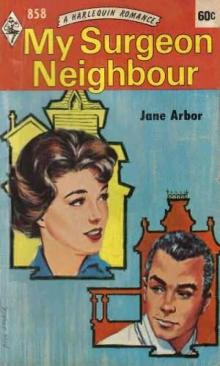 My Surgeon Neighbour
My Surgeon Neighbour Lake of Shadows
Lake of Shadows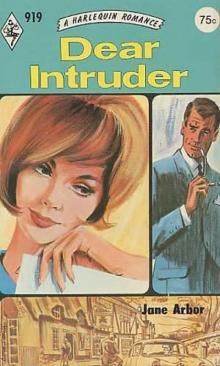 Dear Intruder
Dear Intruder Flash of Emerald
Flash of Emerald Return to Silbersee
Return to Silbersee Far Sanctuary
Far Sanctuary Sandflower
Sandflower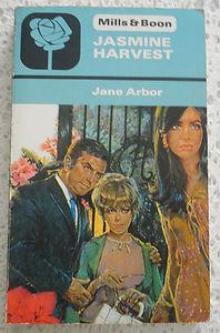 Jasmine Harvest
Jasmine Harvest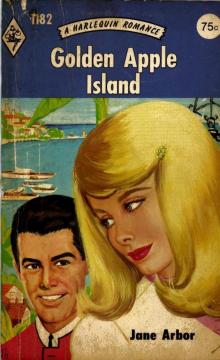 Golden Apple Island
Golden Apple Island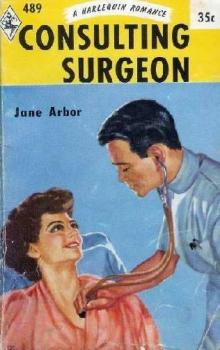 Consulting Surgeon
Consulting Surgeon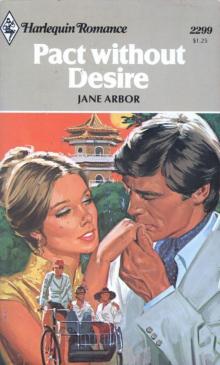 Pact without desire
Pact without desire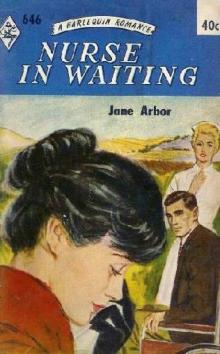 Nurse in Waiting
Nurse in Waiting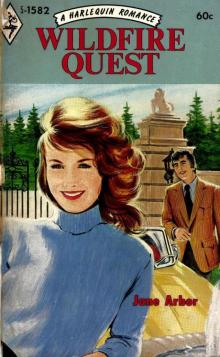 Wildfire Quest
Wildfire Quest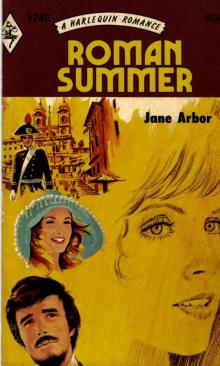 Roman Summer
Roman Summer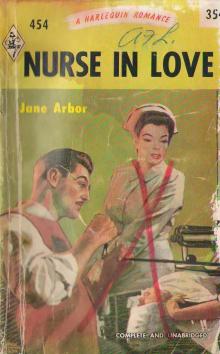 Nurse in Love
Nurse in Love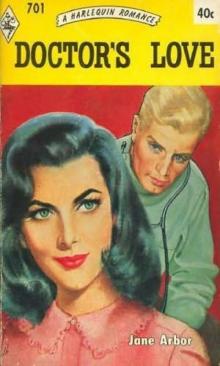 Doctor's Love
Doctor's Love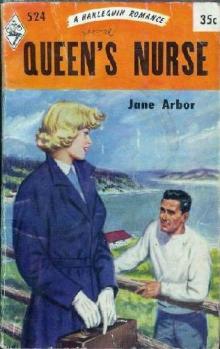 Queen's Nurse
Queen's Nurse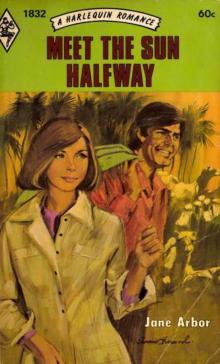 Meet the Sun Halfway
Meet the Sun Halfway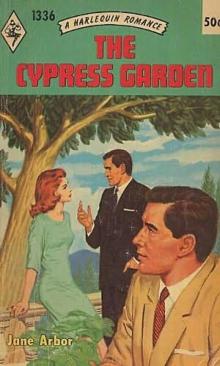 The Cypress Garden
The Cypress Garden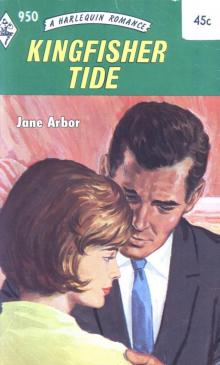 Kingfisher Tide
Kingfisher Tide A Growing Moon
A Growing Moon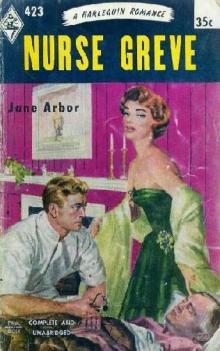 Nurse Greve
Nurse Greve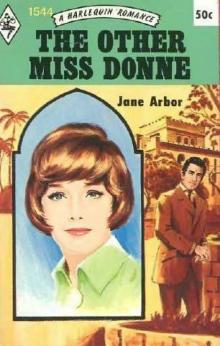 The Other Miss Donne
The Other Miss Donne